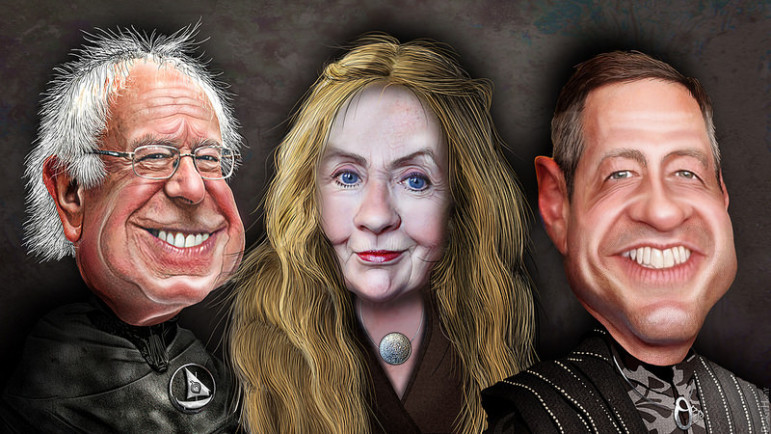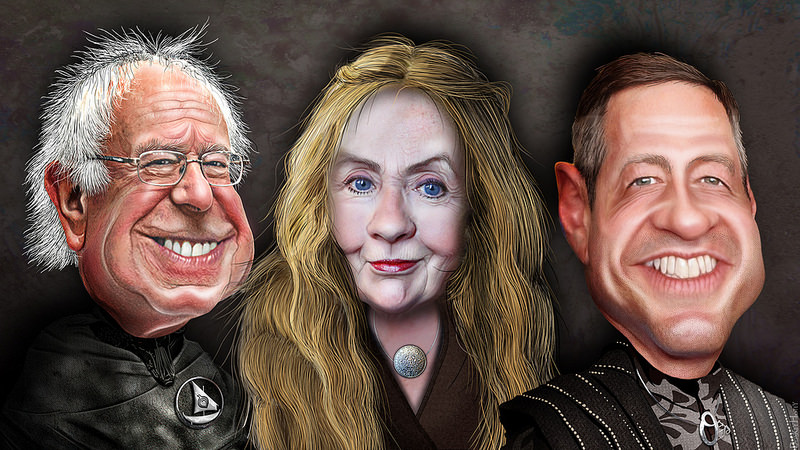Commentary by Len Lazarick of MarylandReporter.com and a conservative take by Professor Richard Vatz of Towson University.

Democrats for President as Game of Thrones: Bernie Sanders, Hillary Clinton, Martin O’Malley. By DonkeyHotey with Flickr Creative Commons License
By Len Lazarick
At the end of Sunday’s night two-hour debate in Charleston, South Carolina, moderator Lester Holt said: “…before we leave, is there anything that you really wanted to say tonight that you haven’t gotten a chance to say. And, we’ll start with Governor O’Malley.” (The audience laughs, according to the Washington Post transcript.)
Not in the transcript, O’Malley shakes his head, and gives Holt a long look and a smile.
HOLT: “Didn’t see that coming, did you?”
O’MALLEY: “Yes, but we’re going to have to get 20 minutes to do it, so…”
Twenty minutes is about the deficit O’Malley had in this debate. He got about 15 minutes to talk compared to about 30 minutes each for Hillary Clinton and Bernie Sanders, as the graph shows. Put another way, O’Malley got just 11% of the debate time.
In the debate and its coverage before and after, NBC made the Democratic contest a two-person race, with O’Malley barely mentioned, except to say he got 2% in the latest national poll, down from 4% in December. By that measure, of course, O’Malley wouldn’t be on the stage at last week’s Republican main debate; he’d barely make the undercard debate.
O’Malley struggled to interject himself in repeated exchanges with Sanders and Clinton on policy, Sanders flailing his arms and close to shouting, Clinton cool and restrained, but raising her voice as well.
The Democrats did attack each other more than they had in previous debates, but it was tame compared to the Republican debate. Because of that, there was much more discussion of policy issues, as opposed to each other, compared to last week’s Republican debate as the second graph shows.
And in sharp contrast to the Republican show, there was generally a full embrace of President Obama’s policies. For the GOP candidates, Obama could do absolutely nothing right; for the Democrats, his policies were sound, but needed some tweaking.
For poor Martin O’Malley, the debate seemed to do him little good. In the Google trends of people searching for more information about him, he was practically flat lining.
O’Malley keeps trying to bring up his accomplishments as governor and no one seems to care. There are plenty of areas where Marylanders might argue about how he presents that record. He talks about “bringing people together” on issues such as gun control, but in Maryland’s Democrat-dominated legislature, he mainly brought Democrats together to pass legislation, and did little to work with Republicans.
O’Malley has become almost a sympathetic figure as he struggles but fails to be taken seriously. His persistent criticisms of the Democratic Party’s debate schedule certainly ring true.
The Dem debates are much fewer than the Republicans are holding, and they are being held on Saturday and Sunday nights. Who on Sunday night, particularly among liberal Democratic voters, was not watching “Downton Abbey” or “The Good Wife”? Good thing many people have DVRs.
Here is Rick Vatz’s take on the debate from a clearly conservative point of view. Of course, none of the people on stage were trying to persuade people like Vatz, but the kind of hard-core Democrats who vote in primaries.
Democratic debate: Mostly Tweedle Dees and Tweedle Dums
By Richard E. Vatz
For MarylandReporter.com
In Charleston, S. C., the last Democratic debate before the Iowa caucuses, widely disparaged as insufficiently publicized by Democrats to advantage former Secretary of State Hillary Clinton, came at a time of relative surging by Vermont Sen. Bernie Sanders.
Former Gov. Martin O’Malley has been criticized for insisting on a role in the debate despite polling support limited to single digits. There really is no reason for O’Malley to recuse himself from these debates, as they may offer him political benefits down the road. Rhetorically, he is conversant with and articulate on all issues.
Few material differences
There were few material differences on matters discussed Sunday night, but on two of the few issues on which there are alleged differences, Sanders, who is virtually tied with Clinton in both Iowa and New Hampshire but not close nationally, has advanced a new position on health care and newly opposed immunity for gun companies regarding crimes committed with guns.
These really represented the only significant disagreements in the debate, and most it was marked by candidates Sanders and Clinton professing agreement with one another.
In advance of the Martin Luther King holiday, all candidates praised Black America with Hillary Clinton speaking of the great influence that King had on her as a young woman, despite her being a Republican throughout her early life.
O’Malley and Sanders criticized Clinton’s “cozy relationship with Wall Street.” Sanders’ attacks on Goldman Sachs regarding Clinton’s receiving of their large speaking fees was telling, but that was where any major disagreements ceased.
Softball questions
Lester Holt played the old role of Bud Wilkinson in Republican debates decades ago by asking softball after softball questions. Andrea Mitchell, thank goodness, was at least significantly less obsequious throughout: she asked how Sanders would pay for his tuition-free college proposals, and he said he would have Wall Street pay for it, but no specifics were offered or demanded.
She asked Sanders about his disparagement of Bill Clinton’s sexual dalliances as president, but did not ask Clinton about her critique of Trump’s alleged sexist behavior, followed by Trump’s alleging her enabling Bill Clinton’s behavior, which in turn have led to Clinton’s stopping such attacks on Trump.
No questions were asking about rampant killings in major cities. There were questions about police violence but none about violence against police.
Sanders wants more mental health treatment available on demand, but is never asked about what evidence there is that such availability has any measurable effect on anti-social behavior or violent behavior.
O’Malley mentioned Black Lives Matter, but was never asked about his changing positions on their issues.
There was a hint of a question of whether the Second Amendment was viable with all of the attacks on it, but only a hint.
Affordable Care Act
No questions were asked about criticisms of the Affordable Care Act — that young people are forced to pay disproportionately, that it covers too much, including parity in mental illness, that it creates, in the words of National Review Magazine, a “bureaucratic nightmare.”
All candidates wanted to raise the minimum wage to $15 per hour, but there were no questions regarding claims that doing so will hurt employers’ ability to hire.
Lester Holt asked about the acrimony in the country but had no questions for Clinton when she accused the Republicans of policies against women, African Americans and others or questions for any candidate regarding President Obama’s divisive rhetoric portraying Republicans as anti-American and even attacking them personally in State of the Union address.
Holt asked how the candidates can convince the public that global warming is sufficiently important that immediate action is necessary. The interesting query, however, is whether global warming is measurably affected by costly human actions, a question that was never asked.
This critic respects Lester Holt as an excellent news anchor but is at a loss to understand how a debate moderator who unquestioningly accepts all progressive principles and policies is doing a valuable public service in conducting a debate.
Turning to foreign policy
The foreign policy component of the debate focused on Iran and the nuclear deal and the exchange of prisoners for hostages.
There were some questions regarding Mr. Obama’s passive foreign policy but none regarding Clinton’s behavior in the Benghazi crisis. Both Clinton and Sanders supported Obama’s policies and held the president guiltless for the growth of ISIS. Sanders calls for the destruction of ISIS but gives not a clue as to how he would do so. At least Andrea Mitchell asked questions on these matters.
She also asked about the president’s reneging on his “red line” promise if Syria used chemical weapons. Clinton held the president faultless on this violation of his promise. There was no follow-up from the moderators, Sanders or O’Malley
The candidates were asked about Russia’s attacks on Ukraine, and Clinton claimed that in not acting the United States got some cooperation from President Putin, but none of the candidates was asked specifically as to why the United States acted neither regarding Ukraine nor Russia’s incursion into Syria.
Only one disinterested journalist
A genuine debate moderated by disinterested journalists would have been valuable, but only one was interested even in some modest challenges. Lester Holt allowed no Republican positions to dilute the questioning. Andrea Mitchell acquitted herself decently, however.
If the debate changed any voters’ minds, it may have redounded to the benefit of Sanders, who, despite his far left ideology, seemed to be that rarity in politics: the utterly sincere candidate.
Professor Vatz teaches political rhetoric at Towson University.







If the Congress can finance presidential campaigns, it certainly can find a few million more to finance these debates, whose hosting and moderation by the media is demonstrably conflicted, ineffective and dysfunctional. Get rid of the commercials and broadcast each debate across all media outlets, not just NBC or Fox, or whatever proprietary feed is on the a la cart menu.